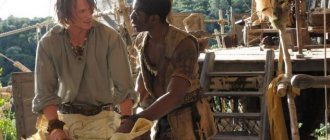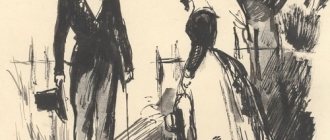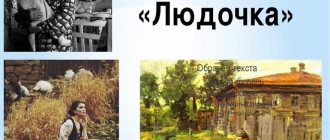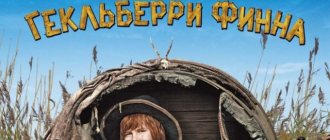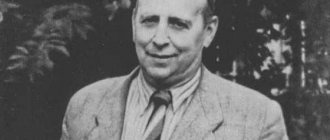- Summary
- Solzhenitsyn
- Matryonin yard
The action of the work takes place in 1956 in the small village of Talnovo. The main character, who tells us the story of a Russian woman, decides to settle in this place to teach children. Matryona Ignatievna's house was inhabited by cockroaches, mice and, of course, cats. She also loved to care for flowers, which grew very well for her.
The woman got up very early, cleaned up the housework, and then cooked breakfast for the lodger. In the village they lived from hand to mouth, and Matryona Ignatieva could not get pension money for herself. But she helped her neighbors on the site, caring for the plants. By winter, she was finally able to get herself a pension, and immediately bought herself winter clothes, and put the rest of her savings aside for a rainy day.
During the long evenings, Matryona tells the man her fate. For him, her story seems unusual and interesting. Her husband went to war and never returned. Her husband loved her very much and did not beat her like his fellow villagers. Matryona did not have any special feelings for him, since she was in love with his brother, however, Thaddeus disappeared while participating in the hostilities of 1914. She waited for him for a long time, but was forced to become Efim’s wife. Unexpectedly, Thaddeus returns, who, it turns out, was in captivity. He began to kill her, although, of course, he wanted to do it so much, and married another woman with the same name. He had 6 children. But his ex-fiancee had no children; they died in early infancy.
Matryona began raising one of Thaddeus’s daughters until Kira started a family and left for another village. Since the woman was often ill, after her death she bequeathed to her niece an addition to the hut. The girl comes to Matryona and says that the outbuilding must be transported and placed on her land, otherwise she will not become the owner of the plot.
Thaddeus and his sons showed up to help and began to separate the outbuilding from the hut. It was terribly cold outside, and so the upper room lay in the hut for a long time. Soon Thaddeus decided to take the upper room to the place, and Matryona gathered with him too. However, the village soon learned that the train at the crossing ran into the sleigh in which Matryona and Thaddeus’ son were riding, where they died.
When morning came, they delivered Matryona and began preparations for the funeral. The relatives were very upset about the death of the woman and cried loudly. Only Thaddeus did not come to see off his former love. After the funeral, the guest settled with the new owner, and often remembered only good things about her.
The story teaches us to be strong in spirit in the most difficult trials.
Summary of Matryonin Dvor by chapters
Chapter 1
Ten years later, after a long stay in the camps, the narrator returns to Russia from Asia. Having years of imprisonment behind him, he still managed to find something he liked - the job of a teacher. The desire to settle in a populated area far from cities also came true. The man was assigned to one of the local barracks in the village of Torfoprodukt. However, wanting to be in a separate room, in solitude, he continued to search for housing.
Having rented a room in Talnovo from a lonely sixty-year-old woman, he was satisfied with the lack of connection with civilization. The author was glad of his position and the hospitality of the benevolent Grigorieva Matryona Vasilievna. Everyone in the village called her Matryona. The owner of the house had no means of subsistence and did not seek profit in anything. The illness, which periodically forced her to go to bed, did not prevent her from getting up early in the morning and doing ordinary things: milking the goat, lighting the stove, preparing food. After a long day of work at the table, the narrator was faced with a late awakening and a meager breakfast.
Every day, doing the same type of work - picking berries, preparing peat, Matryona forgot about illnesses and problems for a while. She had a lot of worries. Peat extraction in the village was illegal, which instilled fear in women. But their plight, unlike their superiors, who stocked up on fuel for the entire winter, forced them to engage in such activities, despite the protocol and threats of taking cases to court. Matryona spent too much time preparing papers to receive a pension and collecting hay for the goat. If all the work was over, she was invited to the factory or to the neighbors to dig potatoes. The hardworking woman unfailingly went to everyone’s rescue, refusing monetary reward. Having recovered from another attack, she again took up work. When it was Matryona Vasilyevna’s turn to feed the shepherds, she did it without complaint, despite the lack of funds. Everyone knew about the lack of fear in doing work. But not everyone knew about her panicky fear of lightning, trains and fire.
A small pension, buying felt boots, padded jackets, repairing a coat - all the joy that befell Matryona this winter. Some envied her, but Matryona herself only rejoiced at the joy of others. It seemed that the disease had subsided. One day a strange event happened in the church. The disappearance of her container with holy water at the blessing of water greatly upset the woman. Left without supplies of living water, she saw this as an unkind sign.
Chapter 2
Ease of communication and lack of curiosity made Matryona and the author’s life together relaxed. The man continued to go to work at school, and in the evenings until late at night he prepared for lessons. He knew little about the mistress of the house - only about her husband, who disappeared in the war.
One day, coming home after work, the author met an old man waiting for him. Having learned the reason for the visit, the teacher decided not to change his mind. The reason for the conversation was the poor performance of the guest’s grandson, Antoshka Grigoriev. Despite poor grades, the boy continued to study. The narrator considered it unfair to leave the situation in this position. Later it turned out that this student was a relative of Matryona.
That same evening the narrator learned some facts from her difficult life. Matryona's husband at that time was Thaddeus. He did not return from the war; the woman married Yefim. But the first one showed up. Having buried her children, she was a foster mother for Kira, who became the driver’s wife and left for Cherusti, from where she provided Matryona with a little help.
The hostess told the guest about the will that had been drawn up in advance: the extension to the house belonged to Kira, the rest was expected by the sisters. Knowing this, Thaddeus decided to transfer part of the hut to the young family during his lifetime. The following nights became sleepless for Matryona. She was worried about her relative’s insistent offer to give the room to the girl. One winter day, the author watched with pity as the building, which had faithfully served her for forty years, was falling apart log by log. Thaddeus’s young son-in-law went to Chelusi to pick up a tractor. A strong snowstorm, the loss of a cat - all this depressed Matryona even more.
Due to Thaddeus's greed, it was not possible to remove the log house on one trip. The second sled, stuck at a railroad crossing, broke down. The hum of the tractor prevented us from hearing the locomotive, which approached unnoticed. The inevitable collision led to the death of the driver, the son of Thaddeus and Matryona. Late in the evening, Matryona's house was visited by four people in overcoats. An attempt to find traces of the celebration ended in failure. After they left, friend Masha came. She spoke in detail about what happened. That same evening she took the bundle that was due to her after Matryona’s death. The author fell asleep to the fuss of mice and cockroaches, remembering the threat made by Thaddeus forty years ago. In those distant years, having unexpectedly returned from the war, he wanted to deal with his wife.
Chapter 3
The next day they brought Matryona's body. Village residents took turns approaching the coffin to say goodbye to the deceased. Many did this out of curiosity, without showing any feelings of regret.
Insincere crying was heard from the sisters, who were looking forward to their share of the inheritance. Their only interest was to quickly take back their property, which was stipulated by the will. Their bitter tears are a sign of decency in such a situation. Matryona’s relatives also wailed, trying to comply with the ritual. The real sobs were the crying of Kira and Thaddeus’s wife, Matryona. The adopted daughter of the deceased was not herself: the death of Matryona, the arrest of her husband, the death of her uncle. Cold-blooded Thaddeus lingered briefly near the coffin of the deceased. His thoughts were far away. The old man was impatient to return the sleigh that had been left at the crossing. He achieved their return even before the relatives were taken to the cemetery.
During the funeral, two processions could not separate in the middle of the village: the question was whose coffin would be carried first.
The next day's wake was distinguished by lively conversations on abstract topics: the sister-in-law's husband glorified his singing at the funeral, and fellow villagers were discussing Matryona's husband. They argued about that part of the house, because of which the disaster happened, and about the rest of the poor property. They remembered Efim; it was possible for him to be saved and live in another place. The small property, which did not attract much attention, was divided surprisingly peacefully among the relatives present. None of them remembered Matryona anymore. All the time the farewell to the dead was taking place, train traffic was canceled. The repairs did not stop for days. An investigation was underway.
The deceased's house was boarded up. The author soon moved in with a relative of Matryona Vasilyevna. He learned a lot about her previous family life and relationship with Yefim. His fellow villagers explained his betrayal by his wife’s excessive simplicity, uncleanliness, and reluctance to think about herself. A completely different side was revealed to the author. No one understood her warmth and gentle disposition. The lack of savings after death caused indignation among relatives. The woman’s dependability and kind soul only evoked condemnation from the outside. The worldview of the village residents was very different from Matryona Vasilievna’s understanding of life. Their envy, malice, and greed were contrasted with the kindness, selflessness and principles characteristic of the life of a righteous person.
The work teaches you to remain human in any situation, to be able to show compassion and respect for loved ones.
You can use this text for a reader's diary
Summary of the story “Matrenin’s Dvor” by A.I. Solzhenitsyn.
The fate of the narrator is similar to the fate of Alexander Isaevich Solzhenitsyn himself - he is also a front-line soldier. And his return from the front was also delayed by “ten years.” That is, I had to serve time for nothing - like half the country, if not more, was in camps at that time.
The hero dreams of working as a teacher in the rural outback - away from civilization. He served his exile “in the dusty hot desert” - and now he is irresistibly drawn to the middle zone of his beloved Russia.
In 1956, Ignatyich was rehabilitated and in the summer he got off the train one hundred and eighty-four kilometers from Moscow.
At first he wanted to live in the village of Vysokoye Polye, but there were shortages of bread there. The food in another village is not bad - but the hero is disgusted by its terrible Soviet name “Torfoprodukt”. However, it’s not just peat bogs all around... The teacher settles in the village of Talnovo, where he teaches mathematics at school. Matryona Vasilievna Grigorieva takes him to her apartment (or rather, to her hut). They live in the same room, but the old woman (she is sixty years old) is so quiet and helpful that no conflicts arise, except that the hero, out of camp habit, became agitated that the woman somehow put on his padded jacket by mistake. Moreover, the loudspeaker really irritates Ignatyich - he can’t stand noise at all, especially the peppy radio.
Matryona's hut is old. The best part of it, by the window, is occupied by stools and benches with her favorite ficus and other plants. This shows Matryona’s kindness, her love for all living things. She is a completely selfless person - she never “chased for money”, she did not accumulate goods for herself, she helped strangers. Of all Matryona's goods, there is only a lame cat, chosen out of pity, and a dirty white goat with crooked horns. Well, also mice and cockroaches...
Gradually Matryona tells the tenant about her life. She got married early because her mother died and she had to somehow arrange her life. She liked one young man - Thaddeus. Yes, he went to the front (this was before the revolution, during the First World War) and disappeared without a trace. I waited for him for three years - “no news, not a bone.” I received an offer from Thaddeus’s younger brother, Efim. She agreed and got married. And after a short time Thaddeus returned from Hungarian captivity. He loved Matryona very much - out of jealousy he almost chopped his brother and ex-fiancée with an ax. But nothing, it settled down.
Thaddeus eventually also got married, and took Matryona as his wife, no less - in memory of his first love. The “Second Matryona” gave birth to six children to Thaddeus, all of whom are alive. But Matryona, although she gave birth to children, they “didn’t last” for her - they didn’t live to see three months. The village decided that she was “spoiled.” Then Matryona took in Thaddeus’s daughter Kira and raised her for a long time - until she got married and moved to a neighboring village to live with her husband.
The fact that Matryona has no goods does not mean that she is lazy - she gets up every day at four or five in the morning, she has a lot to do. She is always ready to help a neighbor dig potatoes or run at the call of the chairman’s wife to help with collective farm affairs. She doesn’t take money from anyone, which is why they think she’s stupid.
Matryona did not receive a pension, although due to her age and illness she could have received one. She worked half her life on a collective farm for “sticks” of workdays. And she kept getting in the way of “the peasant’s work”: even, like Nekrasov’s heroine, she stopped a galloping horse, and he almost knocked her into an ice hole!
Matryona's selflessness is so great, and her love for her neighbors is so strong, that during her lifetime she decides to give half of her hut and property to her adopted daughter Kira. Thaddeus supports this decision of hers: and loads parts of the house and belongings onto the sleigh. Together with his sons, he drags his former beloved's goods across the railroad tracks. Matryona helped them and died while hesitating near the sleigh.
Fellow villagers cannot appreciate Matryona's nobility. There is crying over the coffin - but, rather, out of duty and out of decency. Soon the division of property begins, in which both the greedy sisters of the deceased and her best friend Masha take part. And Thaddeus, in general the involuntary culprit in the death of his former beloved, did not even show up to the wake.
And only the teacher, Matryona’s guest, clearly understands that Matryona is the righteous man without whom “the village does not stand.”
“A village is not worthwhile without a righteous man” - this was originally supposed to be the title of the story “Matrenin’s Dvor”
Matrenin Dvor - a summary of the chapters of Solzhenitsyn's work
Chapter 1 The author-narrator returns from “places not so remote” to Russia in 1956. No one is waiting for him, and there is no need for him to rush. He has a great desire to be a teacher somewhere in the taiga outback. He was offered to go to Vysokoye Polye, but he didn’t like it there, and he voluntarily asked to go to the place “Torfprodukt”. In fact, this is the village of Talnovo. In this locality, the author met a kind woman at the market who helped him find shelter. So he became Matryona's lodger. In Matryona's hut there lived mice, cockroaches and a lanky cat. There were also ficus trees on the stools, and they were also members of Matryona’s family. The rhythm of Matryona’s life was constant: she got up at 5 in the morning because she didn’t rely on the clock (they were already about 27 years old), fed the goat and prepared breakfast for the tenant. Matryona was told that a decree had been issued according to which it was possible to receive a pension. She began to seek a pension, but the office was far away, and there, either the stamp was in the wrong place, or the certificate was out of date. In general, everything did not work out. In general, people lived in poverty in Talnovo. And this despite the fact that the village was surrounded by peat bogs. But the lands belonged to the trust, and in order not to freeze in winter, people were forced to steal peat and hide it in secluded places. Matryona was often asked by fellow villagers for help on their plot. She did not refuse anyone and provided assistance with pleasure. She liked the growth of living plants. Once every 6 months, Matryona’s turn came to feed the shepherds, and this event drove Matryona into great expense. She herself ate sparingly. Closer to winter, Matryona received a pension. The neighbors began to envy her. Matryona made herself new felt boots, a coat from an old overcoat and hid 200 rubles for the funeral. Epiphany has arrived. At this time, her younger sisters came to Matryona. The author was surprised that they had not come to her before. Matryona, having received her pension, became more joyful and, one might say, “flourished in her soul.” The only sad thing was that in the church someone took her bucket of holy water, and she was left without a bucket and without water. Chapter 2 All of Matryona’s neighbors were interested in her guest. Because of her old age, she recounted their questions to him. The narrator told Matryona that he was in prison. Matryona was also not particularly willing to talk about her life. About the fact that she got married and gave birth to 6 children, but they all died in infancy. My husband did not return from the war. One day Thaddeus came to Matryona. He pleaded for his son in front of the narrator. In the evening, the author learns that Thaddeus is the brother of Matryonushka’s deceased husband. That same evening Matryona opened up, told how she loved Thaddeus, how she married his brother, how Thaddeus returned from captivity and she apologized to him. How Thaddeus later married another girl. This girl gave birth to six children to Thaddeus, but Matryona’s children did not live well in this world. Then, according to Matryona, the war began, the husband went to fight and never returned. Then Matryona took her niece Kira and raised her for 10 years until the girl grew up. Since Matryona was in poor health, she thought about death early, accordingly she wrote a will and in it she promised a room-annex to Kira. Kira comes to Matryona and talks about how in order to get ownership of the land, you need to build something on it. So Thaddeus began to persuade Matryona to move the annex to Kira in the village. Matryona doubted for a long time, but still decided. Then Thaddeus and his sons began to separate the upper room from the hut. The weather was windy and frosty, so the upper room lay disassembled near Matryona's hut for quite a long time. Matryona was grieving, and on top of that, the cat was missing. One fine day, the author came home and saw Thaddeus loading a room on a sleigh to transport it to a new place. Matryona decided to escort the upper room. Late at night, the author heard voices and learned the terrible news that at the crossing the locomotive collided with the second sleigh and the son of Thaddeus and Matryona were killed. Chapter 3 It's dawn. They brought Matryona's body. Preparations for the funeral are underway. Her sisters grieve “from the people.” Only Kira is sincerely sad, and Thaddeus’s wife. The old man was not at the wake - he was trying to deliver a sleigh with boards and logs home. Matryona was buried, her hut was boarded up, and the narrator was forced to move to another house. He always remembered Matryonushka with a kind word and affection. The new owner always condemned Matryona. The story ends with the words: “We all lived next to her, and did not understand that she was the same righteous man, without whom, according to the proverb, not a village would stand. Neither the city. Neither the whole land is ours.”
